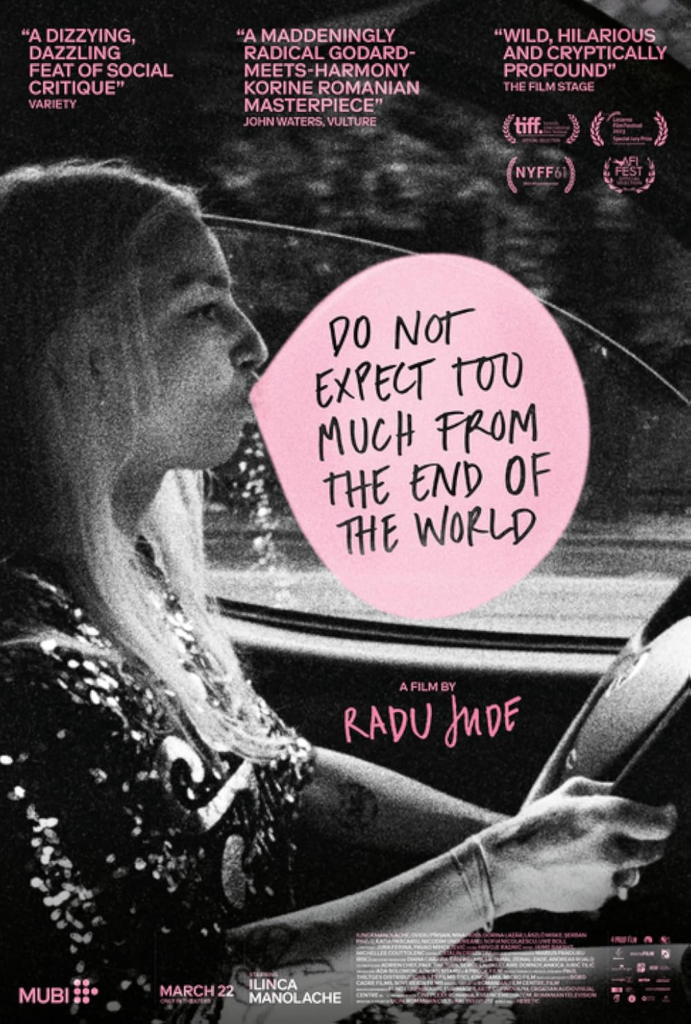Do Not Expect Too Much From the End of the World Christian Review

The first thing you need to know about Do Not Expect Too Much From the End of the World is that it’s not an easy film to watch, and that’s entirely by design. Radu Jude doesn’t just want to make you uncomfortable—he wants to confront you with the absurdity, the chaos, and the brokenness of modern existence. He throws a Molotov cocktail of satire, frustration, and dark comedy at the viewer. This film is abrasive and unapologetically cynical. But as a Christian viewer, where do we find ourselves amidst this whirlwind? What do we take from a film that revels in the absurdity of the world while offering little in the way of hope or redemption?
A Molotov Cocktail of Absurdity
The film captures a sense of contemporary malaise like nothing else, and it’s immediately clear that Jude is unencumbered by traditional storytelling methods or the polite norms of cinematic taste. There’s something refreshing about that. It feels like the kind of film that would prefer to slap you across the face than politely ask for your attention. In this, Jude’s work is reminiscent of the prophet Jeremiah, who didn’t mince words when delivering hard truths to a wayward people. But while Jeremiah brought the promise of redemption after judgment, Jude seems content to leave us marinating in our absurdity.
For those of us who believe in a God of order, a God who has a purpose and plan for the world, this film poses a challenge. It’s a film that, in its very DNA, seems to deny the possibility of divine order. Instead, Jude gives us a world that’s spinning off its axis, where capitalism, history, and human relationships are all reduced to absurd, sometimes laughable, fragments. As Christians, we are called to see the world differently—to recognize that beneath the chaos, God is at work, bringing about His kingdom in ways we might not always see.
The Power of Patience: Pushing Through the Chaos
There’s something to be said about sitting through a difficult film, and Do Not Expect Too Much From the End of the World certainly fits that description. It runs for 163 minutes, and its jagged, confrontational style can feel like a gauntlet. As viewers, we are used to neat resolutions, but Jude offers no such comfort. His film is an endurance test of sorts, and perhaps that’s fitting for the times we live in. We are constantly bombarded by chaos, misinformation, and the noise of modern life. We’re impatient by nature, and films like this force us to confront that impatience.
In a way, it echoes the words of James 1:4: “Let perseverance finish its work so that you may be mature and complete, not lacking anything.” Jude’s film isn’t going to give you easy answers. It’s not going to wrap things up in a neat package. But for those willing to sit through the discomfort, there is a reward—if only in the sense that the film holds a mirror up to our current reality and asks us to really look.
Nihilism or Ecclesiastes?
One of the key tensions for Christian viewers is the film’s underlying nihilism. Jude doesn’t just suggest that life is absurd—he revels in it. He seems to say that the only sane response to the absurdity of life is to laugh. As Christians, this presents a problem. While we recognize the brokenness of the world, we also believe in a God who redeems that brokenness, who promises that one day all things will be made new (Revelation 21:5). Jude doesn’t leave room for that kind of hope.
In some ways, the film feels like a modern retelling of Ecclesiastes, with its lament of “meaningless, meaningless, everything is meaningless” (Ecclesiastes 1:2). The writer of Ecclesiastes looks at the world and sees futility in human efforts apart from God. But where Ecclesiastes ultimately points to a life lived in reverence of God as the answer, Do Not Expect Too Much From the End of the World offers no such direction. Instead, it leaves us laughing at our own futility. It’s a powerful commentary on the state of the world, but it stops short of pointing to the deeper truth that our faith offers.
Absurdity as a Call to Action?
One of the most striking aspects of Jude’s film is how it doesn’t just sit with its absurdity—it dares you to respond. There’s a corrosive rage that runs through the film, a frustration with the inauthenticity, the greed, and the dehumanization that permeates our society. The film is a commentary on capitalism, on history, on the ways we commodify human beings, and how we chase after things that do not satisfy.
As Christians, this should hit us hard. Jesus tells us in Matthew 16:26, “What good will it be for someone to gain the whole world, yet forfeit their soul?” Jude’s film feels like a meditation on that very question. It’s a world where people have lost their souls to the pursuit of wealth, success, and image, and it’s both horrifying and darkly funny to witness. But as Christians, we can’t stop at laughing at the absurdity—we are called to be the salt of the earth, the light of the world (Matthew 5:13-16). Jude’s film might not offer us hope, but it does serve as a stark reminder of what happens when a society loses sight of its soul.
The Absence of Redemption
Perhaps the biggest critique I would offer from a Christian perspective is the film’s lack of redemption. Yes, the world is broken. Yes, it’s absurd and chaotic. But as believers, we know that this isn’t the end of the story. The film doesn’t offer a way out—it simply highlights the absurdity and asks us to laugh at it. But we know that true hope comes not from accepting the chaos, but from looking to Christ, who offers peace and redemption in the midst of the storm.
There’s a disconnect between the worldview presented in Do Not Expect Too Much From the End of the World and the hope we find in the Gospel. Jude’s film is brilliant in its execution, but ultimately, it leaves us in the dark. As Christians, we are called to be a light in that darkness, to offer hope where there seems to be none.
Conclusion: A Masterpiece of Absurdity, Lacking in Hope
In the end, Do Not Expect Too Much From the End of the World is a masterful piece of cinema. It’s bold, abrasive, and unafraid to confront the absurdity of the world we live in. But for all its brilliance, it’s missing something fundamental: hope. As Christians, we recognize the absurdity and brokenness of the world, but we also know that God is at work, redeeming that brokenness and bringing about His kingdom.
For its artistic merit and its biting commentary on modern life, I would give Do Not Expect Too Much From the End of the World an 8/10. It’s a film that will make you think, make you laugh, and maybe even make you a little uncomfortable. But in the end, it stops short of offering the hope that we know is possible through Christ.
Rating: 8/10
A challenging, thought-provoking film that critiques modern society with sharp wit but lacks the redemptive hope found in the Christian faith.





